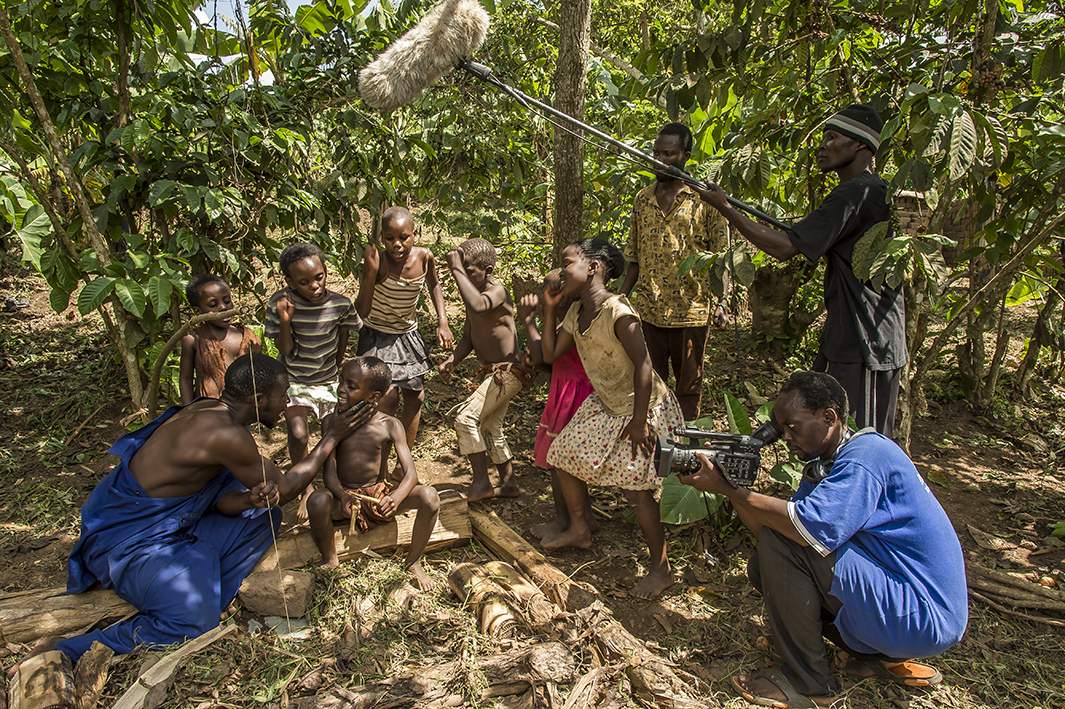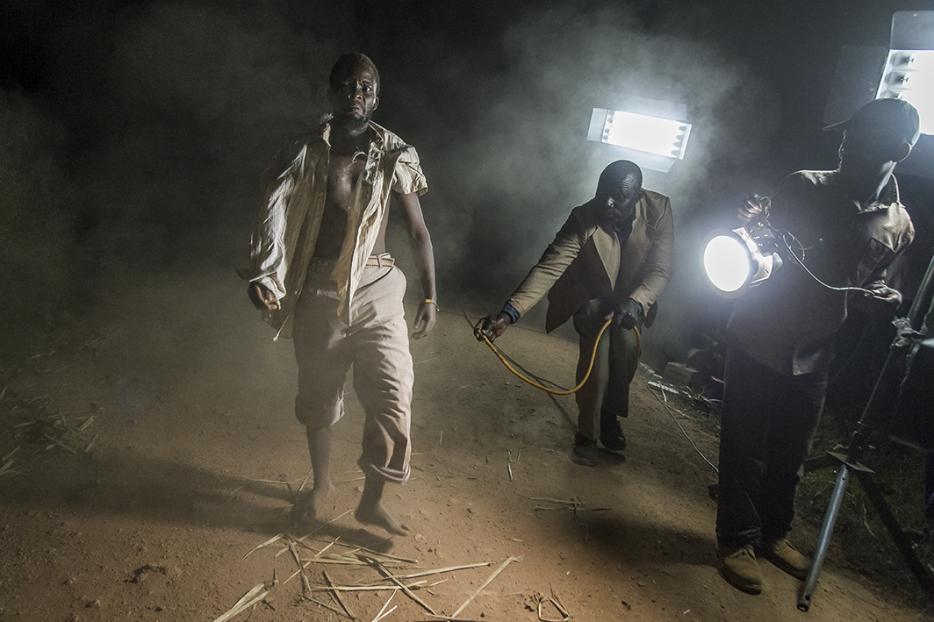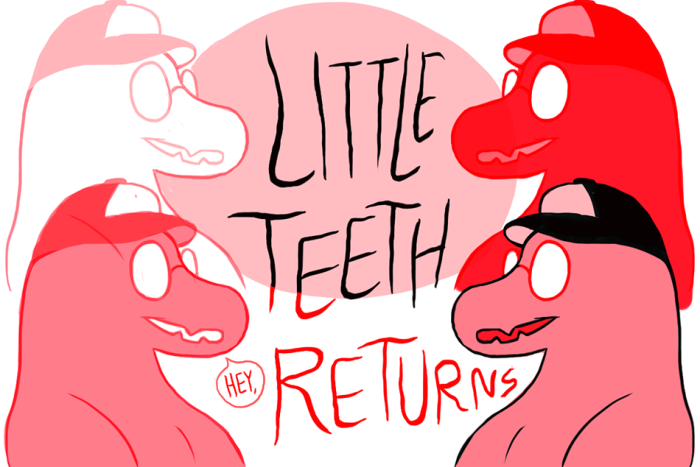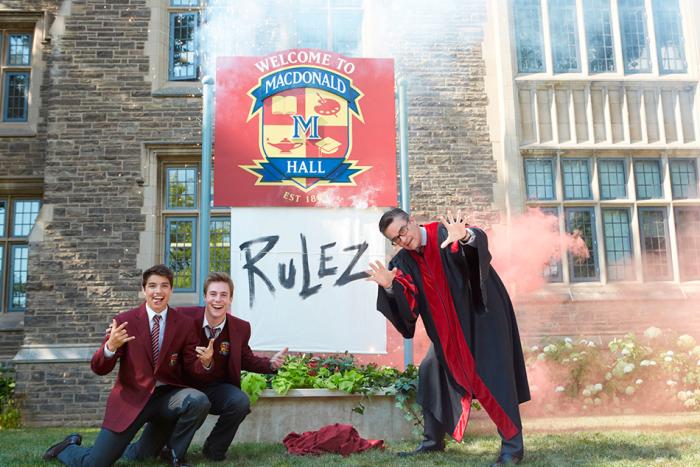Nighttime in the village of Kaliti, Uganda.
It’s disarmingly dark, because there is no electricity here. A man with a movie camera shouts, “Action!” Two hand-built light grids pull power from a faltering generator, shining their beams on a bearded, wild-eyed, undernourished mzungu11 A Central/East African term for white person. in tattered clothes. He’s being chased through the jungle by over a dozen screaming, chanting Ugandans, children included, in full cannibal regalia—banana leaf skirts, necklaces of bones, remnants of goat’s blood.
They corral, form a circle as the terrified intruder is forced to go one-on-one with a new arrival—a robed cannibal priest who adopts a kung fu battle stance. After a limber punch-up and some supernatural combat involving an amputated hand, the mzungu breaks free and the pursuit continues. This time the cannibals are on motorcycle, racing downhill through a forest. They spread out, trapping their unlucky catch in a huge hunting net.
“Cut!”
Later, the Ugandans sip hot water with lemongrass while we mzungus drink Nescafé. On the shooting break, a group of “cannibals” huddle around a laptop I’d brought with me, watching John Wayne in Rio Bravo, their first exposure to the Duke. Nearby, children are keeping themselves entertained with a bloody decapitated prop head.
It’s just another night for the most unlikely of all cinema success stories: Wakaliwood, the DIY action film studio from the slums of Uganda that took over the Internet and made it plausible for anyone in the world to become an East African kung fu movie commando. Under the leadership of self-taught writer/director/editor/producer/SFX guru Nabwana Isaac Godfrey Geoffrey (known as Nabwana IGG) and his company Ramon Film Productions—named after his grandmothers Rachel and Monica, who raised and protected him through Uganda’s civil war—Wakaliwood makes movies for less than $200 US apiece. Their breakout hit—Who Killed Captain Alex? Uganda’s First Action Movie—is one of 40-plus feature films Nabwana has made so far, without access to running water, refrigeration, reliable electricity or dependable computers, way off the grid in the bustling dirt mazes of Wakaliga, a neighbourhood on the outskirts of Uganda’s equatorial capital city of Kampala.
It seems like something conjured up in a film curator’s dream. A neglected corner of Africa, a filmmaker who has crammed a career’s worth of output into 10 years, yet has never set foot inside a movie theatre in his life: in stratified Uganda, cinemas are reserved for the upper classes. Nabwana, who never imagined an audience bigger than his neighbourhood, undermines and upheaves classist Ugandan logic by making rebellious, commercially popular movies on his own terms and drawing attention to Uganda for something beyond gorillas and tragedy.
*
During the 1970s, Uganda was under the rule of Idi Amin, one of the 20th century’s most notorious military dictators. Alongside his policy of expelling citizens of European and Asian descent and expropriating their property, Amin blocked foreign media, television, and movies. His oust in 1979 paved the way for a cultural reset and opening of borders, yet the country was plunged into another six years of brutal civil war. When the mayhem subsided, Reagan-era action hits like Schwarzenegger’s Commando and Stallone’s Rambo: First Blood Part II were among the first Hollywood films to make it into the country, and the impact was enormous. Beefed up macho men like Chuck Norris became the first heroes of the collective Ugandan cinema experience, the Buster Keatons, if you will (“Busta Keaton, World’s 1st Supa Commando” has recently been popularized in Uganda thanks to Wakaliwood efforts).
Young Nabwana was in love with the escapist lure of cinema, a medium he experienced second hand via his older brother, who would attend movies, come home and recite complete plots from memory (a stand-out was the 1978 British mercenaries-in-Africa adventure flick The Wild Geese). Nabwana’s memories of war, of being chased by real soldiers in real helicopters, only fed his interest in conflict-centric stories. His ambition was to milk his memory for populist fun and comedy instead of wallowing in its ravages. Once he had the means, Nabwana was hungry to break the Ugandan cultural hegemony of TV melodramas and “Embassy Films”, the government-approved “poor Africa” film festival submission pieces.
It sounds crazy, but just wait, man.
Nabwana started from zero. To house his family—his wife and co-editor Harriet (AKA Mama Rachel) and kids/actors Rachel, Gitti, and Isaac Newton—he made bricks from the clay-rich dirt in the ground and built a home on a chunk of inherited land. He went to school and learned how to build a computer from scrap parts (but dropped out from lack of money). Acquiring Adobe Premiere and After Effects, he taught himself the basics. He sold everything he had to buy a Sony PD 170 camera. You need to be maniacally determined and exceptionally clever to make films in Uganda, and Nabwana is both.
Nabwana’s brother Robert (aka Kizito, meaning “small but supa tough”—a nickname he shares with their grandmother) is the notoriously limelight shy co-star of Wakaliwood kung fu film Rescue Team. While Nabwana was becoming a self-taught movie mogul, Kizito, along with noted Wakaliwood actors Wamala Peter and Bukenya Charles (aka Bruce U, the Ugandan Bruce Lee, star of The Return of Uncle Benon) bought magazines on Chinese kung fu and taught themselves martial arts, eventually founding Uganda’s first kung fu school. Nabwana convinced his brother and friends to act in his movies by splicing their fight footage with sound clips from classic Asian martial arts flicks. This mesh of American, Chinese and Ugandan influences blurred into the idiosyncratic Wakaliwood style of action, action, ACTION!
*
New Yorker Alan “Ssali” Hofmanis is the lone mzungu in the Wakaliwood fold—the outsider who came on a quest for the makers of “da best of da best movies” and never went home. Hofmanis had been a film festival programmer in a past life and knows the world outside the insular Ugandan market. He oversees Wakaliwood’s Internet presence, campaigns, social media, website, and the heavy load of subtitles and localization. As he sees it, the plausible fantasy future for Wakaliwood is to have Nabwana IGG’s first time in a movie theatre take place at the Cannes Film Festival, as a director attending his own film premiere. It sounds crazy, but just wait, man.
Bad Black a.k.a. Black: The Most C.I.D. Wanted (“Criminal Investigation Department” is the Ugandan F.B.I.) features Hofmanis in a starring role. It’s based on the true story of a female Ugandan Robin Hood (“Black”) who swindled a fortune from a British businessman. In the Wakaliwood version, Hofmanis plays an American philanthropist doctor from a family line of commandos. And Black doesn’t steal his money, she steals his dog tags. Hofmanis takes a crash course in commando training from a local kid (The Karate Kid in reverse), then basically blows up the slums. The camera was already rolling on this film within hours of Nabwana and Hofmanis’s first meeting. Nabwana was pumped to have a mzungu actor at his disposal, and Hofmanis won him over when he took a plunge (three times!) into the slum’s open sewer but kept on acting.
This irrepressible enthusiasm that permeates the group is what talked me into visiting Wakaliwood in person in late May 2015, with the financial aid of friends and family. I brought a suitcase full of electronic gear (laptop, hard drives, video cards), items that are typically overpriced or tough to find in Uganda, paid for by Wakaliwood’s crowdfunding campaign (to which I contributed $20) or donated by fans who’d heard about my trip. Digital storage is a premium issue; Nabwana’s home editing station is littered with fried hard drives, victims of power surges and constant dust exposure from the hot, humid environment. Some contain the only existing copies of Wakaliwood films now otherwise lost, such as Tebaatusasula, a completed feature film.

There’s lots on the burner, including an upcoming kids’ robot film called Million Dollar Kid. According to Hofmanis, the robot “is going to have a remote control that the kids get hold of and they think it’s a game. And it destroys Kampala.” There are four to five music videos soon to be released, featuring musicians who either came to Wakaliwood personally to make a video, or hired them remotely. There’s also a major and possibly feature length Wakaliwood documentary in the works. If the overwhelming difficulties (financial and political) of securing passports and visas for Nabwana, VJ Emmie, Dauda, and other major players can be overcome, there are plans to travel around North America or Europe as a Wakaliwood roadshow.
The morning of my departure from Uganda, Nabwana informs me that it’s time to gear up. Dauda escorts me to the prop room, where I am sized up for a commando outfit, big black boots, and one of Dauda’s prop guns. Securing the army fatigues was a coup—“impersonating an officer” is a punishable offence in Uganda. You can’t just shop at an army surplus store.
As the green screen is nailed to the brick exterior wall of Nabwana’s house, the crowd starts to gather. Children, goats, and curious locals mill about and I’m feeling very conspicuous, a mzungu in war clothes. I am not an actor, and now I am sweating, expected to perform publicly in front of a green screen, no clue what I’m supposed to be interacting with, as Nabwana feeds me phonetic lines in Luganda.
Fumbling my way, I am then sent sneaking past the communal outhouses, around the side of a building. I give my best over-the-top look of horrified astonishment then leap into action, screaming and blasting at Kizza and Search—playing cannibals munching on Hofmanis’s innards—and faking recoil from the prop gun. The whole neighbourhood is watching me.
I find out later that Nabwana is logging footage for a future project, Wakaliwood Vs. The World, where all visiting mzungus will speak in Luganda and all Ugandans speak in English. Some behind the scenes footage has popped up in which they gave me the title: “David Bertrand—Canada’s Greatest Action Star.”
And why not? If Wakaliwood is proof of anything, it’s what's possible if you have the supa commando spirit. For anyone thinking of visiting Uganda or East Africa, I’ve been instructed to tell you: “Please visit! We’d love to kill you.”
From the Wakaliwood & Ramon Film Productions Action-Packed Fanpage, Dec 31st, 2015: “Been a hell of year, and gonna get crazier!” MOAR SUPA ACTION COMING SOON!!






